英语U2知识汇总
U2知识点归纳
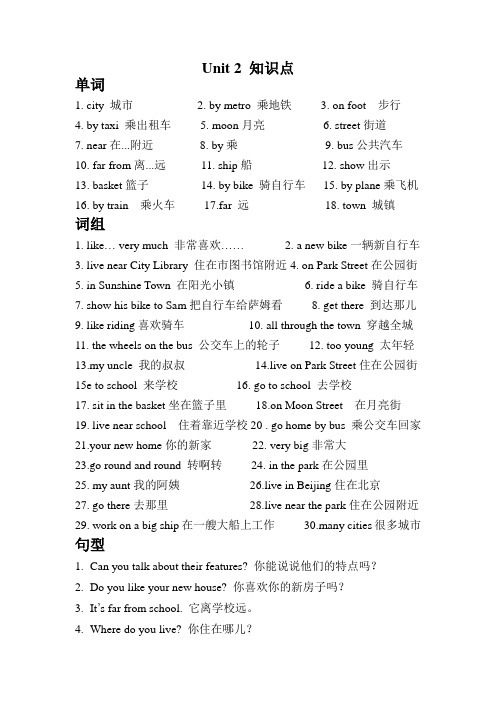
Unit 2 知识点单词1. city 城市2. by metro 乘地铁3. on foot 步行4. by taxi 乘出租车5. moon月亮6. street街道7. near在...附近8. by乘9. bus公共汽车10. far from离...远11. ship船12. show出示13. basket篮子14. by bike 骑自行车15. by plane乘飞机16. by train 乘火车17.far 远18. town 城镇词组1. like… very much 非常喜欢……2. a new bike一辆新自行车3. live near City Library 住在市图书馆附近4. on Park Street在公园街5. in Sunshine Town 在阳光小镇6. ride a bike 骑自行车7. show his bike to Sam把自行车给萨姆看8. get there 到达那儿9. like riding喜欢骑车10. all through the town 穿越全城11. the wheels on the bus 公交车上的轮子12. too young 太年轻13.my uncle 我的叔叔14.live on Park Street住在公园街15e to school 来学校16. go to school 去学校17. sit in the basket坐在篮子里18.on Moon Street 在月亮街19. live near school 住着靠近学校20 . go home by bus 乘公交车回家21.your new home你的新家22. very big非常大23.go round and round 转啊转24. in the park在公园里25. my aunt我的阿姨26.live in Beijing住在北京27. go there去那里28.live near the park住在公园附近29. work on a big ship在一艘大船上工作30.many cities很多城市句型1.Can you talk about their features? 你能说说他们的特点吗?2.Do you like your new house? 你喜欢你的新房子吗?3.It’s far from school. 它离学校远。
Unit 2 知识点梳理
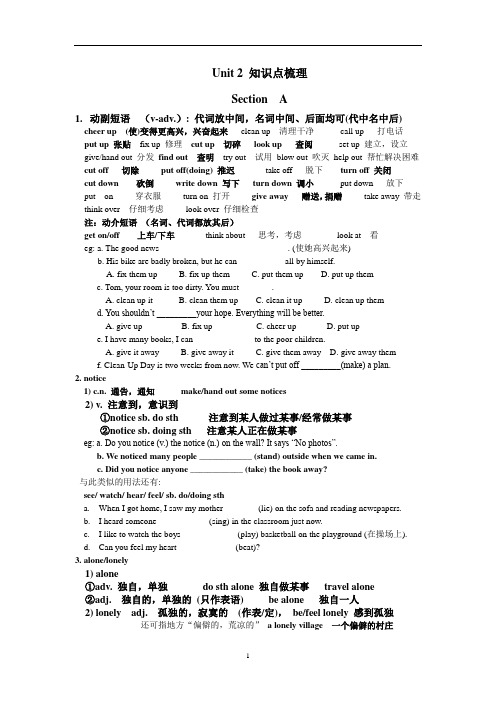
Unit 2 知识点梳理Section A1.动副短语(v-adv.): 代词放中间,名词中间、后面均可(代中名中后) cheer up (使)变得更高兴,兴奋起来clean up 清理干净call up 打电话put up 张贴fix up 修理cut up 切碎look up 查阅set up 建立,设立give/hand out 分发find out 查明try out 试用blow out 吹灭help out 帮忙解决困难cut off 切除put off(doing) 推迟take off 脱下turn off 关闭cut down 砍倒write down 写下turn down 调小put down 放下put on 穿衣服turn on 打开give away 赠送,捐赠take away 带走think over 仔细考虑look over 仔细检查注:动介短语(名词、代词都放其后)get on/off 上车/下车think about 思考,考虑look at 看eg: a. The good news _________ __________ _________. (使她高兴起来)b. His bike are badly broken, but he can __________ all by himself.A. fix them upB. fix up themC. put them upD. put up themc. Tom, your room is too dirty. You must _______.A. clean up itB. clean them upC. clean it upD. clean up themd. You shouldn’t _________your hope. Everything will be better.A. give upB. fix upC. cheer upD. put upe. I have many books, I can _____________ to the poor children.A. give it awayB. give away itC. give them awayD. give away themf. Clean-Up Day is two weeks from now. We can’t put off _________(make) a plan.2. notice1) c.n. 通告,通知make/hand out some notices2) v. 注意到,意识到①notice sb. do sth 注意到某人做过某事/经常做某事②notice sb. doing sth 注意某人正在做某事eg: a. Do you notice (v.) the notice (n.) on the wall? It says “No photos”.b. We noticed many people ____________ (stand) outside when we came in.c. Did you notice anyone ____________ (take) the book away?与此类似的用法还有:see/ watch/ hear/ feel/ sb. do/doing stha.When I got home, I saw my mother _______ (lie) on the sofa and reading newspapers.b.I heard someone ___________ (sing) in the classroom just now.c.I like to watch the boys ____________ (play) basketball on the playground (在操场上).d.Can you feel my heart _____________(beat)?3. alone/lonely1) alone①adv. 独自,单独do sth alone 独自做某事travel alone②adj. 独自的,单独的(只作表语) be alone 独自一人2) lonely adj. 孤独的,寂寞的(作表/定),be/feel lonely 感到孤独还可指地方“偏僻的,荒凉的”a lonely village 一个偏僻的村庄比较: alone (adj./adv.) 侧重形体上的孤单;lonely (adj.) 指精神方面,内心孤独。
七年级上册译林版英语知识点u2

七年级上册译林版英语知识点u2 U2单元主要涉及介绍人物、家庭和朋友的基本英语句型以及情态动词can和may的用法。
以下是本单元的重点知识点:一、人称代词人称代词指代人物,包括主格和宾格。
主格:I/you/he/she/it/we/they宾格:me/you/him/her/it/us/them二、be动词的用法be动词表示状态或者身份,包括am/is/are。
例如:I am a student.(我是一个学生。
)She is my friend.(她是我的朋友。
)三、情态动词can的用法can表示能力或者请求,用于表示能够做某事或者请求做某事。
例如:I can swim.(我会游泳。
)Can you help me, please?(请问你能帮我吗?)四、物主代词的用法物主代词表示所有,包括我的(my)、你的(your)、他/她的(his/her/its)、我们的(our)、你们的(your)、他们/她们的(their)。
例如:This is my pen.(这是我的笔。
)五、询问和回答家庭情况的句型询问:What’s your family like?回答:My family is small/big.我有三口人。
My family has three people.我有两个姐妹。
I have two sisters.六、情态动词may的用法may表示许可,用于询问或者答复允许做某事。
例如:May I go to the bathroom?(我可以去洗手间吗?)Yes, you may.(可以。
)七、祈使句的用法祈使句用于表示请求或者命令,常用动词原形加上主语you来构成。
例如:Open the door, please.(请开门。
)Do your homework now.(现在做作业。
)。
U2 知识点笔记
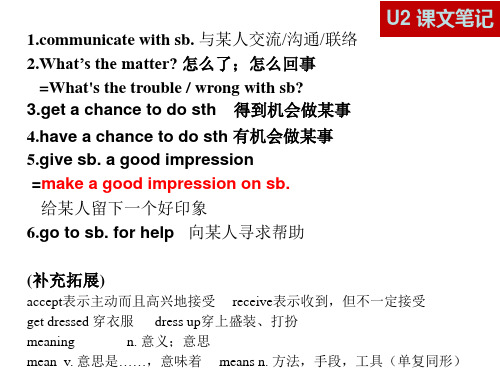
➢ 一个动名词作主语时,谓语用单数:如:
Communicating is not just speaking. 交流不仅仅是说话。
municate with sb. 与某人交流/沟通/联络 2.What’s the matter? 怎么了;怎么回事
=What's the trouble / wrong with sb? 3.get a chance to do sth 得到机会做某事 4.have a chance to do sth 有机会做某事 5.give sb. a good impression =make a good impression on sb.
U2 课文笔记
9.sit up straight 坐直 10.remind sb + that从句“提醒某人……” remind sb of sth 使某人想起某事 remind sb about sth提醒某人(关于)某事 remind sb to do sth“提醒某人做某事” 11. think over 好好考虑;熟虑 think it/them over 12.the key to sth/doing sth
It’s no use doing sth 做某事没有用。 It’s no good doing sth. 做某事没有好处。
6.注意2:我们不一样
拓展与复习:下列单词既可以接动词不定式也可以接动 名词作宾语,但意思相差较大。
go on stop forget remember try
to do
doing
八年级上册英语u2知识点
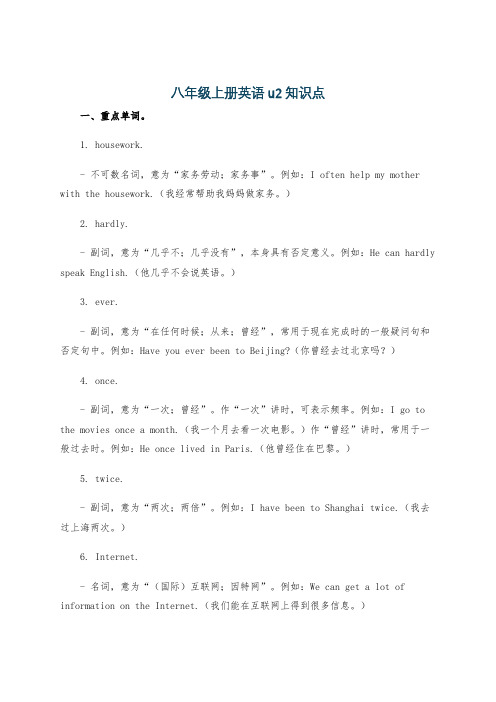
八年级上册英语u2知识点一、重点单词。
1. housework.- 不可数名词,意为“家务劳动;家务事”。
例如:I often help my mother with the housework.(我经常帮助我妈妈做家务。
)2. hardly.- 副词,意为“几乎不;几乎没有”,本身具有否定意义。
例如:He can hardly speak English.(他几乎不会说英语。
)3. ever.- 副词,意为“在任何时候;从来;曾经”,常用于现在完成时的一般疑问句和否定句中。
例如:Have you ever been to Beijing?(你曾经去过北京吗?)4. once.- 副词,意为“一次;曾经”。
作“一次”讲时,可表示频率。
例如:I go to the movies once a month.(我一个月去看一次电影。
)作“曾经”讲时,常用于一般过去时。
例如:He once lived in Paris.(他曾经住在巴黎。
)5. twice.- 副词,意为“两次;两倍”。
例如:I have been to Shanghai twice.(我去过上海两次。
)6. Internet.- 名词,意为“(国际)互联网;因特网”。
例如:We can get a lot of information on the Internet.(我们能在互联网上得到很多信息。
)7. program.- 名词,意为“(电视)节目;程序”。
例如:My favorite TV program is the news.(我最喜欢的电视节目是新闻。
)8. full.- 形容词,意为“忙的;满的;充满的”。
be full of = be filled with,意为“充满……;装满……”。
例如:The glass is full of water.(杯子里装满了水。
)9. maybe.- 副词,意为“大概;或许;可能”,通常放在句首。
八年级英语u2知识点归纳总结
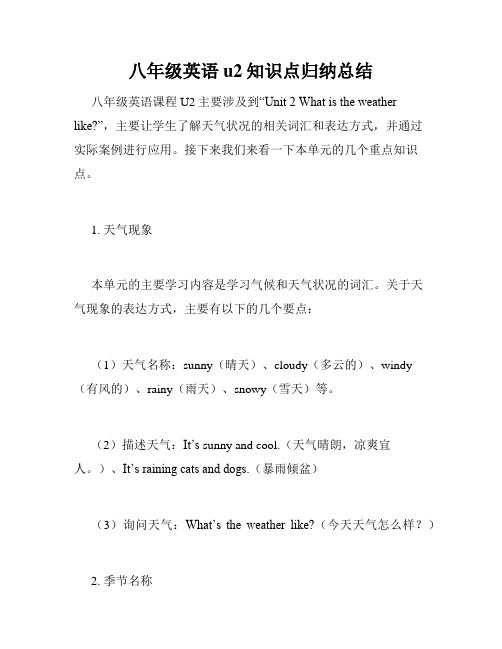
八年级英语u2知识点归纳总结八年级英语课程U2主要涉及到“Unit 2 What is the weather like?”,主要让学生了解天气状况的相关词汇和表达方式,并通过实际案例进行应用。
接下来我们来看一下本单元的几个重点知识点。
1. 天气现象本单元的主要学习内容是学习气候和天气状况的词汇。
关于天气现象的表达方式,主要有以下的几个要点:(1)天气名称:sunny(晴天)、cloudy(多云的)、windy(有风的)、rainy(雨天)、snowy(雪天)等。
(2)描述天气:It’s sunny and cool.(天气晴朗,凉爽宜人。
)、It’s raining cats and dogs.(暴雨倾盆)(3)询问天气:What’s the weather like?(今天天气怎么样?)2. 季节名称在此期间学习英文季节名称时,应了解四个季节的名称及其特点。
主要有如下几点:(1)春季:Spring,主要特点是温暖和花海。
(2)夏季:Summer,主要特点是炎热和沙滩。
(3)秋季:Autumn,主要特点是凉爽和硕果累累。
(4)冬季:Winter,主要特点是冷和雪。
3. 动词短语本单元的动词短语主要是用来描写天气的。
比如:(1)变化:change,The weather changes often in spring.(春季天气常常变化。
)(2)开始:begin,It began to rain five minutes ago.(五分钟前开始下雨。
)(3)停止:stop,The rain stopped after two hours.(两小时后,雨停了。
)(4)持续:last,How long will the snow last?(雪会持续多久?)4. 有关衣物的表达天气状况的变化,常常要求我们对穿着做出相应的调整。
因此,掌握关于衣物的表达方式,是非常重要的。
主要包括:(1)衣着:wear,What should I wear today?(我今天该穿什么?)(2)衣物名称:coat(大衣)、sweater(毛衣)、boots(靴子)等。
八年级上册英语u2知识点总结
八年级上册英语u2知识点总结Unit 2主要介绍了一些形容词和副词的用法,以及一些语法知识。
下面是本单元的知识点总结:一、形容词和副词的用法1.形容词形容词用于描述名词或代词的属性。
一般放在名词前面,例如:a tall boy(一个高个子男孩)。
2.副词副词用于描述动词、形容词、副词的程度或方式。
一般放在动词后面,例如:He walks slowly.(他走得慢慢的。
)二、比较级和最高级1.比较级比较级用于描述两个事物之间的比较,形容词和副词的比较级通常在单词末尾加“-er”,例如:taller(更高的),more carefully (更小心地)。
2.最高级最高级通常用于描述三个或三个以上的事物之间的比较,形容词和副词的最高级通常在单词末尾加“-est”,例如:tallest(最高的),most carefully(最小心地)。
三、祈使句祈使句表示请求、命令、建议、劝告等含义。
祈使句一般省略主语,动词用原形。
例如:Open the door.(开门。
)四、情态动词情态动词用于表示说话人的态度、愿望、建议、可能性等,常见的情态动词有:can、could、may、might、must、should、would 等。
例如:I should study harder.(我应该更努力学习。
)五、被动语态被动语态用于表示动作的承受者或者是动作的发生者不明确。
被动语态由助动词be+动词的过去分词构成,例如:The window was broken by the wind.(窗户被风摔碎了。
)六、虚拟语气虚拟语气用于表示非真实的情况,常见的虚拟语气有:与现在事实相反的虚拟语气、与过去事实相反的虚拟语气、与将来事实相反的虚拟语气等。
例如:If I were you, I would go to bed early.(如果我是你,我会早点睡觉。
)七、定语从句定语从句用于对一个名词或代词进行修饰。
定语从句通常由关系代词who、whom、whose、which、that引导。
U2知识点归纳(可编辑修改word版)
班级:姓名:Unit 2 At the airport【知识点梳理】Ⅰ.Words1.airport (n.) 机场arrive at the airport2.Los Angeles 洛杉矶 a trip to Los Angeles3.before (adv.) 以前—Have you ever been to Shanghai before? 你以前去过上海吗?—No. This is my first time. 没有,这是第一次。
You must wash your hands before (have) lunch.You must wash your hands before you (have) lunch.( after 在…之后)4.T-shirt (n.) T 恤衫plenty of T-shirts5.several (adj.) 几个several silk scarves (scarf)6.however (adv.) 然而,不过;仍然7.pack (v.) 装(箱);打(包)pack these books into boxes 把这些书打包(装箱)pack the suitcases 整理手提箱pack (n.) 包;捆 a pack of……一包……8.flight (n.) 航班;班机 a flight trip; flight numberfly (v.) flew- flown-flying9.passenger (n.) 乘客;旅客10.departure (n.) 离开;出发departure time 出发时间; arrival time 到达时间depart (v.) 离开,启程We departed for (=leave for)London at 10 a.m. 11.worry (v.) 担心worry about sth.; Don’t worry.worried (adj.) 焦虑的be worried about sth12.London (n.) 伦敦13.note (n.) 注释;提醒;注意事项eg. There is a note on the board beside the river :Don’t swim in the river!note (n.) 笔记take notes 记笔记14.trolley (n.) 手推车复数:trolleys15.passport (n.) 护照;通行证show me your passport16.bring (v.) 带……到某处;带来;拿来—brought —broughttake, bring, fetch 的区别(1)take 意为“把(物)拿去;带走;把(人)带去”Take these plates to the kitchen. 把这些盘子拿到厨房去。
U2知识点整理
U2知识点整理unit2water我喜欢单词和短语1.value(n.)价值valuable(adj.)有价值的冻结冻结寒冷的frozen(adj.)冰冻的;冷冻的化学的;化学的;化学的(复数)化学的化学e(n./v.)使用useful(adj.)有用的useless(adj.)无用的5.tooth(n.)牙齿teeth(复数)牙齿6.病人病人不耐烦不耐烦的病人9.mean(v.)意为meaning(n.)意思有意义的有意义的,无意义的10.清洁(v.);清洁11.joy(n.)乐趣enjoy(v.)享受enjoyable(adj.)有趣的;舒服的12.treat(v.)处理;对待treatment(n.)处理;对待放松,放松放松;享受放松(adj.)轻松的放松的感觉放松增加和增加;附加的15.pollute(v.)污染pollution(n.)污染16.puzzle(v.)使…迷惑(n.)拼图令人费解的令人费解的感到困惑17奇怪(形容词)奇怪的陌生人速度加快速度浪费浪费浪费浪费20.dirt(n.)泥土dirty(adj.)脏的1.pourain to pour a into/into B2环顾四周3.欣赏风景4.dropaintob把a扔进b5.speeddown快速下滑6.carryatob把a带到b7.cleanup彻底清洗8.awatertreatmentworks水净化厂9.athoroughcleaning彻底的清洗10.asewageplant污水处理厂(adv.)舒适地;舒适地;舒适地;舒适地;舒适地;舒适地;舒适地;舒适地;舒适地做某事意味着。
你这是什么意思?15.turnon打开turnoff关闭调高音量调低音量调低音量调低音量16.beon上映;上演on(adj.)已连接、处于工作状态或使用中消失,消失。
befaint=软弱17.look/smell/taste/sound/feel+adj.18.soundpuzzled19.soundimpatient工厂=工厂21无人=无人24.itis+adj+forsb.todosth.对于某人来说做某事怎么怎么样。
U2知识点
Unit 2一、词组:1.eat my cake 吃蛋糕2.drink my milk 喝牛奶3.my English book 我的英语书4.up and down 上上下下5.an English book 一本英语书6.want to想要…7.a book 一本书8.in the library 在图书馆二、句型:1. Would you like a sweet? 你想要一块糖吗?2.Don’t eat here. 不要在这儿吃东西。
3. I’m sorry. 对不起。
(很遗憾)4. Is this your book? 这是你的书吗?5. Yang Ling is walking up and down. 杨玲正上下走动。
6. I want to sleep. 我想睡觉。
三、知识重点:1、Don’t run.\eat.\shout.\talk. 此句为祈使句的否定句式。
祈使句表示请求、命令、建议等等。
谓语动词一律用原形。
句子中通常没有主语。
例如:Come in, please.Look at the blackboard.Listen to the teacher.而祈使句的否定句则需在动词前加“don’t”。
表示“不要…”例如:Don’t come in, please.Don’t look at the blackboard.Don’t listen to the teacher.2、Would you like a sweet?意为“你想要一块糖吗?”“Would you like…”句型表示“你想要…”后面一般跟名词。
例如:Would you like a toy car?Would you like an apple?Would you like some milk?回答:Yes, please. No, thank you. (回答是这个句型的重点)区分:Do you like cats? 你喜欢猫吗?当用“Do you…”句型进行提问时,切记它的回答只有:Yes, I do. No, I don’t.3、“want to”表示想要做某事,后面通常跟动词原形。
- 1、下载文档前请自行甄别文档内容的完整性,平台不提供额外的编辑、内容补充、找答案等附加服务。
- 2、"仅部分预览"的文档,不可在线预览部分如存在完整性等问题,可反馈申请退款(可完整预览的文档不适用该条件!)。
- 3、如文档侵犯您的权益,请联系客服反馈,我们会尽快为您处理(人工客服工作时间:9:00-18:30)。
Unit 2 More exercise
一、词组:(四会)
1. do some exercise 做一些锻炼
2. do more exercise 做更多的锻炼
3. be good at running 善于跑步
4. be better at jogging 更善于慢跑
5. do well in PE 在体育方面好
6.do better in swimming 在游泳方面做得更好
7. want to do better想要做得更好
8. need help with my Maths 在数学方面需要帮助
9. run faster than me 跑得比我快10. run as fast as me 跑得和我一样快
11. swim slower than me游得比我慢12. swim as slow as me 游得和我一样慢
13. jump very high 跳得很高14. jump higher than my brother跳得比我的弟弟高15.get stronger 变得更强壮16. jump as high as him 跳得和他一样高
17. get up earlier更早地起床18. some of the boys 男孩中的一些
19. talk to…about…和某人谈论某事20. don’t know how不知道怎么办
21. What’s the matter? 怎么了?22. jog to school 慢跑上学
23. all of us/them/the girls/the doctors 我们/他们/女孩/医生中的所有人
24. read better than all of us 比我们所有人读得好
25. in your/ our/ class 在你/ 我们班
26. every day/morning/afternoon/evening 每天/每个早晨/下午/晚上
27. a good football/basketball/volleyball/baseball player
一个出色的足球/篮球/排球/棒球运动员
28. at weekends/home /the party /six /school /an Art lesson
在周末/ 家/ 聚会上/六点钟/学校/美术课
29. after school /class/ lunch/ Christmas 放学后/课后/午饭后/圣诞节后
30. would like to do=want to do 想要做某事
31. start our lesson 开始上我们的课32. do different sports做不同的运动
33. well done做得好34. skate so well溜冰溜得如此的好
35. an animals show/ a flower show 一场动物表演/一个画展
36. skate better溜冰溜得更好37. like them better更喜欢它们
38. swim beautifully游得优美39. read the new words读新单词
40. fly in the flowers在花丛中飞舞
二、词组:(三会)
1、let sb do sth让某人做某事
2、in the sports field 在运动场地
3、see something else看见别的什么
4、around the lake绕着湖
5、have five minutes to remember them 有五分钟来记住它们
6、some ducks on the lake 一些在湖面上的鸭子
7、how beautiful the butterflies are! 多么漂亮的蝴蝶啊!
三、四会句型:
1. I run faster than Ben. 我比本跑得快。
2. Mike runs as fast as Ben. 迈克跑得和本一样快。
3. I jump higher than Jim. 我跳得比杰姆高。
4 .Jim jumps lower than me. 杰姆跳得比我低。
5. Who goes to school earlier, Liu Tao or Jim ? Liu Tao. 谁上学更早,刘涛还是吉姆?刘涛。
Liu Tao goes to school earlier than Jim .
6. Whose kite flies lower, the boy’s or the girl’s? The boy’s.
谁的风筝飞得低,男孩的还是女孩的?
The boy’s kite flies lower than the girl’s . 男孩的风筝飞得比女孩的低。
7. Who run faster, the boys or the girls? 谁跑得更快,男孩们还是女孩们?
The boys run faster. 男孩们跑得更快。
The boys do. 是男孩们。
They do. 是他们。
8. Who jump higher than the boys? 谁比男孩们跳得更高?
The girls jump higher than the boys. 女孩们比男孩们跳得跟高。
The girls do. 是女孩们。
9. Do the boys jump higher than the girls? 男孩们跳得比女孩们高吗?
Yes, they do. 是的。
10. The boys jump higher than the girls . 男孩们跳得比女孩们高。
The girls don’t jump higher than the boys . 女孩们跳得没有比男孩们高。
11. Does Jim swim slower than David? Jim游得比David慢吗?
Yes, he does. 是的。
Jim swims slower than David . Jim游得比David慢。
12. Does Mike sing better than Nancy ? 麦克比南希唱得好吗?
No, he doesn’t . 不是。
Mike doesn’t sing better than Nancy . 麦克没有比南希唱得好。
13. Do you need help with your homework? 你在你的家作方面需要帮助吗?
No, I’m not doing well in PE. 不,我在体育方面学得不好。
14. I am good at swimming . =I do well in swimming. 我擅长游泳。
I’m not good at writing. =I don’t do well in swimming. 我不擅长写作。
15. Jim does well in Maths. Jim在数学方面好。
But Jim doesn’t do well in PE. 但是Jim在体育方面不好。
三、语音
or---/ /or for fork forty before horse morning sports short
order more airport accordion
/ / worker work word world
/ / doctor visitor mirror forget calculator。
